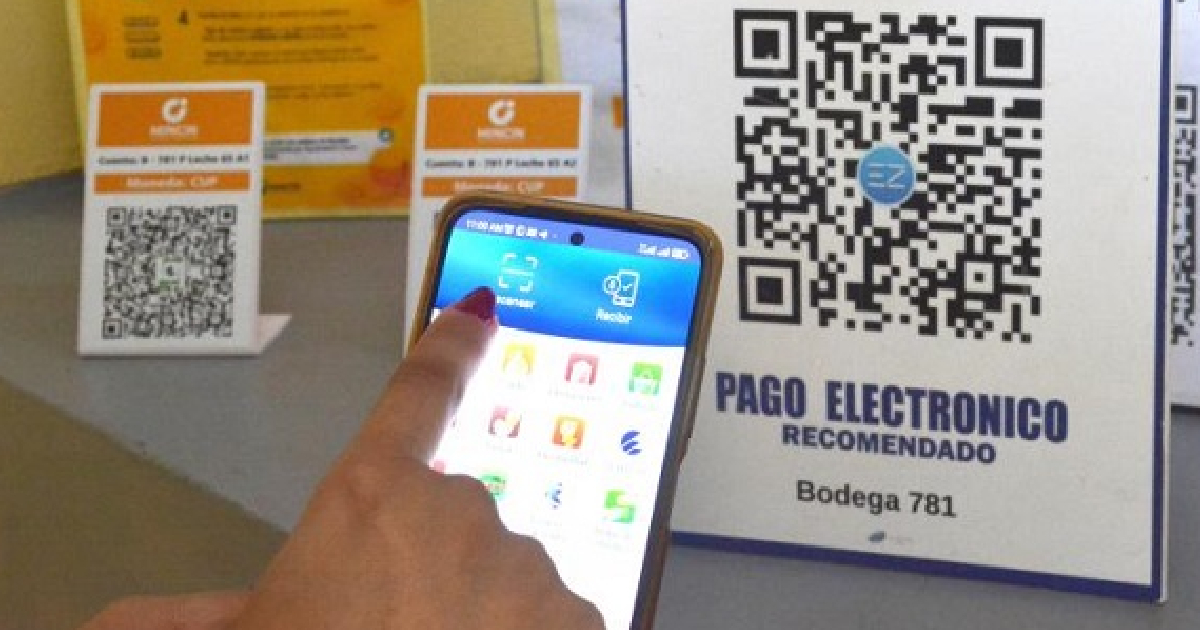In April, the Cuban government shut down 476 businesses across the country for not allowing citizens to use electronic payment channels for services or goods, as mandated by the regime's banking program. Betsy Díaz Velázquez, the Minister of Domestic Trade (Mincin), stated on the official "Mesa Redonda" program that the number of closed establishments for not using electronic payment methods, as required by Resolution 93 of 2023, is still "insufficient" because in some provinces, "the level of enforcement against violators is low."
Díaz specified that during April, the number of inspections of private and state entities increased, with 8,169 "control actions" carried out. However, she acknowledged that public complaints about establishments not accepting electronic payments have also risen. According to her, state-run companies "must set an example." Despite 98% of retail entities implementing these payment systems, complaints about establishments where people couldn't pay using electronic methods persist.
She revealed that the most significant issues are found in state-owned and leased agricultural markets, bakeries of the Cadena Cubana del Pan, and other state management forms that haven't even created the necessary transaction codes or expanded the use of electronic payment channels. In the private sector, Díaz noted that some companies with "import levels" show no transactions in their fiscal accounts, meaning their codes are unused.
Furthermore, Díaz mentioned the practice among non-state entities of charging customers a 10-15% fee for using electronic payment channels and making payments to personal accounts instead of the business account. She warned that "it's a matter of respecting what the State has established; governments legislate, and norms must be respected."
The Mincin head also disclosed that licenses have been revoked in 380 establishments, and fines have been imposed. However, she deemed the current fines, ranging from 25 to 100 pesos under Decree 184, insufficient. "That has no effect, but we are modifying the Decree. The fines will be substantial - she threatened - and we will also put an end to the closures (of establishments). There must be rigor."
The minister emphasized that the government would continue working to enforce these policies nationwide, justifying their necessity by citing the cash shortage, a significant problem for citizens, especially when withdrawing salaries or pensions from ATMs with insufficient funds.
Last November, the Cuban regime mandated that all businesses provide consumers with the necessary means for electronic payment. The Official Gazette of the Republic published Resolution 93 of 2023 from Mincin, obligating commercial entities to provide consumers access to electronic payment channels.
The measure required these establishments to have payment facilities through national gateways or point-of-sale terminals for the commercialization of goods and services. At that time, according to official information, the country had at least 20,000 commerce units with electronic payment capabilities. It was determined that both state and non-state economic actors conducting activities overseen by Mincin would also be required to ensure electronic payment channels.
Before the measure took effect on February 2 of this year, the Cuban government warned that businesses without electronic payment options would face fines, closures, and confiscations.
Enforcement of Electronic Payment Regulations in Cuba
The following questions and answers provide more insight into the enforcement of electronic payment regulations in Cuba and the impact on businesses and consumers.
Why did the Cuban government shut down 476 businesses?
The government closed these businesses because they did not comply with the mandate to offer electronic payment options, as required by Resolution 93 of 2023.
What are the main issues with electronic payment implementation in Cuba?
The main issues include the lack of transaction codes, limited use of electronic payment channels, and additional fees charged by non-state entities for electronic payments.
What actions has the government taken against non-compliant businesses?
The government has revoked licenses from 380 establishments, imposed fines, and is working on increasing the penalties for non-compliance.
